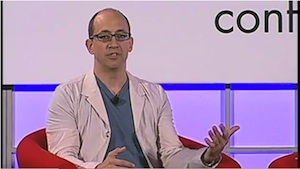 Twitter chief executive Dick Costolo today addressed one of the constant questions facing Twitter: Will the company, which famously operated for years without any real revenue, ever turn into a big business?
Twitter chief executive Dick Costolo today addressed one of the constant questions facing Twitter: Will the company, which famously operated for years without any real revenue, ever turn into a big business?
“We’re a remarkably successful business,” he said.
Costolo, who was interviewed on-stage at the D9 conference in Rancho Palos Verdes, Calif. (he’s pictured above at another conference), repeated his statement that Twitter is deliberately adding companies slowly to its advertising program. Last year, he said that Twitter planned to work with “low hundreds” of advertisers by the end of the year, and now he says that the number turned out to be around 150. Bringing the statistics up to the current day, he said Twitter has worked with around 600 or 650 advertisers and that those advertisers have run about 6,000 or 7,000 campaigns.
So even though it’s a relatively small program, the campaign engagement rates are the real mark of success, Costolo said. Those rates compare favorably with traditional digital media advertising, he said. A Volvo campaign had a 52 percent engagement rate — in other words, “Of all the people who saw the ad, more people engaged with it than didn’t.” When Radio Shack ran a Promoted Trend around purchasing a new phone, it saw a double-digit percentage increase in purchases and exchanges over the following few days.
June 5th: The AI Audit in NYC
Join us next week in NYC to engage with top executive leaders, delving into strategies for auditing AI models to ensure fairness, optimal performance, and ethical compliance across diverse organizations. Secure your attendance for this exclusive invite-only event.
Interviewer Walt Mossberg pressed Costolo on whether that means Twitter is profitable. After all, that sounds like an advertiser’s “wet dream,” Mossberg said. Costolo declined to comment, except to say, “We don’t need to optimize for near-term revenue. We need to optimize for long-term success.” (Someone in the conference press room remarked, “That means the answer is no.”) Costolo was similarly noncommittal about a possible public offering, saying only that IPOs are “not correlated” with long-term success.
